Table of Contents
These are specialties that Aaron's Dive Shop can support.
BOAT DIVER
This course helps you expand your knowledge about boats from small inflatables to large liveaboards. You’ll gain experience scuba diving by completing two dives from a boat.
Much of the world’s best scuba diving is accessible only by boat. Whether you’ve never made a boat dive or you’ve logged dozens, the PADI Boat Diver Specialty course will benefit you because boats in various parts of the world do things differently. Scuba diving from a boat is fun and relatively easy because you usually descend directly onto your dive site.
The PADI Boat Diver course teaches you about the advantages and ease of diving from a boat. You’ll practice boat diving techniques and learn:
- Boat terminology.
- Boat diving procedures and etiquette, including how to enter and exit, and where to stow your gear.
- Boating safety, including how to locate safety equipment.
Course breakdown:
This course is conducted during 2 open water dives.

Prerequisites:
- Must be certified as a PADI (Junior) Open Water Diver or higher
- Must be at least 10 years old
Materials Needed:
- Materials needed will be provided.
Cost:
$232
CORAL REEF CONSERVATION DIVER
Coral Reefs are the most diverse habitats in the ocean and they are home to a startling diversity of life. Yet coral reefs are in danger. What we do on land affects the oceans and the animals and plants that live there. This course teaches divers about marine life, how reefs form, and what they can do to help protect these sensitive habitats for future generations.
Course breakdown:
This course is generally scheduled for 2-3 hours, but can be tailored to fit additional interests
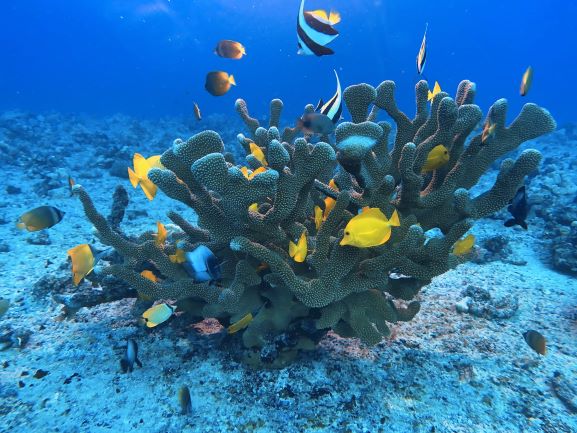
Prerequisites:
- There are no prerequisites for this course- you don’t even need to be a diver! All are welcome.
Materials Needed:
- No materials are needed for this course.
Cost:
$154
DEEP DIVER
Recreational diving allows people to descend to 130 feet under the water. PADI defines deep diving as any dive that exceeds a depth of 60 feet. Amazing rock and reef formations, different fish species, and most shipwrecks are found on deep dives. Students will learn about the extra precautions and equipment which are needed to safely make deep dives. They will also learn more about why colors fade at depth, why air is consumed faster, and how to respond to nitrogen narcosis. Divers refamiliarize themselves with how to determine safe dive times and proper techniques for completing safety stops.
Course breakdown:
This course is taught over 2-4 days. There are 4 deep dives required for certification. The first dive will be a depth of 60-100 feet. Dives 2-4 may be between 60-130 feet.

Prerequisites:
- Students must be certified as adventure diver, advanced open water divers or higher.
- Must be at least 15 years old.
Materials Needed:
- Materials needed will be provided.
Cost:
$514
DIVE AGAINST DEBRIS DIVER
Project AWARE’s flagship citizen-science program, Dive Against Debris®, empowers scuba divers to remove marine debris from the ocean and report data on the types, quantities, and locations of materials collected.
Since the program’s launch in 2011, more than 86,000 divers have participated in Dive Against Debris in 120 countries around the world, reporting over 1.6 million pieces of trash. As the only underwater debris data collection program of its kind, Dive Against Debris both improves the health of ocean ecosystems through localized volunteer efforts and provides valuable information about underwater debris to help inform policy change.
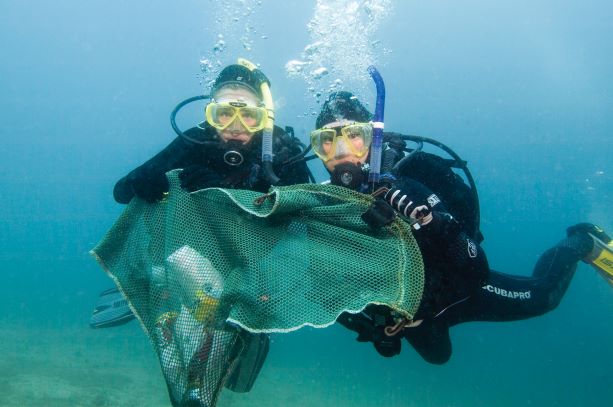
Prerequisites:
- Must be certified
Materials Needed:
- Materials needed will be provided.
Cost:
$154
DRIFT DIVER
We learn as divers to always dive against the current- not so with drift diving!
This relaxing way to dive allows you to drift with the currents and cover huge areas with relatively little effort. Not only that, but diving in high current areas means that you’ll see different sorts of sea life and dramatically increases your chances of seeing big pelagic (open ocean) animals.
Students will learn about currents and tides as well as techniques and gear used to make a safe and enjoyable drift dive.
Course breakdown:
This course occurs over two dives at locations with strong currents. Drift dive are often quite long as divers are exerting less effort and therefore using less air.
Prerequisites:
- Must be certified open water divers or higher.
- Must be at least 12 years old.
Materials Needed:
- Materials needed for the course will be provided for use during the dives.
Cost:
$232
FISH IDENTIFICATION DIVER
There are around 30,000 fish in the world! While this course can’t teach you to recognize them all, it will provide you with the skills necessary to look them up, and the ability to identify many of the most common fish in your area; including the humuhumunukunukuapua’a.
Students will learn to use body shape, fin shape, mouth placement, color pattern, swimming style, behavior, and habitat to identify the common reef fish families. With a little travel and a lot of practice you may be able to identify the more than 3,000 reef fishes the same way professional marine biologists do during surveys.
Course breakdown:
This course is conducted during 2 open water dives.

Prerequisites:
- Must be certified open water divers or higher.
- Must be at least 10 years old.
Materials Needed:
- There are no materials needed for the course, however, students will need to have read through the course material prior to the open water dive.
Cost:
$232
NIGHT DIVER
The reef comes alive at night. Corals wake up and feed on drifting plankton, while some fish settle down into the reef to sleep and others come out to hunt. Invertebrates seem to come from no where as they crawl over rocks and coral in search of food and mates (while still trying to stay away from all those hungry predators).
Night diving allows you to see a whole new world of diving and with the blackness of the water at night, it’s the closest most of us will ever come to experiencing what it’s like to be an astronaut.
Course breakdown:
This course is conducted during an open water dive following sunset. The is covered in three dives. The first is conducted just after sunset in the twilight hours as the animals change over from those awake during the day to those awake at night. The second dive occurs after the reef has fully darkened allowing dives to witness the wonders of the reef at night- you may even be lucky enough to watch a shark feeding or corals spawning.

Prerequisites:
- Must be certified open water divers.
- Must be at least 12 years old.
Materials Needed:
- Students will need to have at least two underwater flashlights and a marker light. These will be provided for use during the course as needed.
Cost:
$360
ENRICHED AIR (NITROX) DIVER
Want to stay down longer- especially on deep dives? PADI Nitrox Certification may be the answer.
Enriched air refers to gas mixes with some of the nitrogen in the breathing gas being replaced with oxygen. It is commonly referred to as NITROX. Nitrox divers have longer bottom times because there is less nitrogen in their tanks.
Students will learn how to dive safely with this breathing mix. That means you will learn how to determine new depth limits, partial pressures, analyzing gas mixtures, and the physiological benefits and dangers of alternate gas mixes.
Course breakdown:
This course takes 1-2 hours to complete in a classroom, with the option for 2 open water dives.
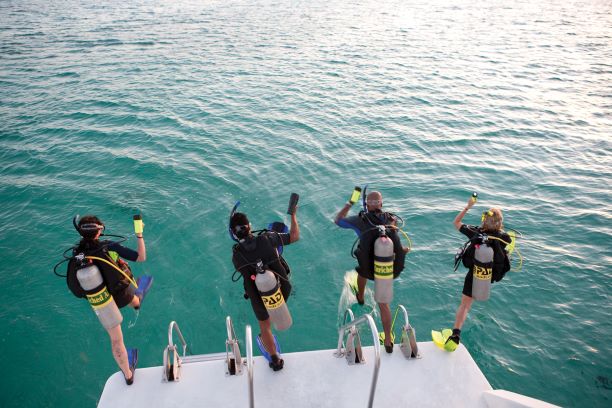
Prerequisites:
- Must be certified open water divers or higher.
- Must be at least 15 years old.
Materials Needed:
- There are no materials needed for the course, but divers should have regulators which are service rated for gas mixtures up to 40% oxygen.
Cost:
$205
PEAK PERFORMANCE BUOYANCY DIVER
Proper buoyancy is arguably the most important dive skill. It keeps you the diver safe as well as the environment you are exploring. From avoiding stirring up sediments and ruining visibility to protecting corals, good buoyancy is essential. It keeps you in a comfortable position in the water and assists with ascents and descents. Good buoyancy is essential. Like any skill buoyancy takes practice to master. This course will give you the skills to be neutral at any depth.
Course breakdown:
This course is conducted during two open water dives.
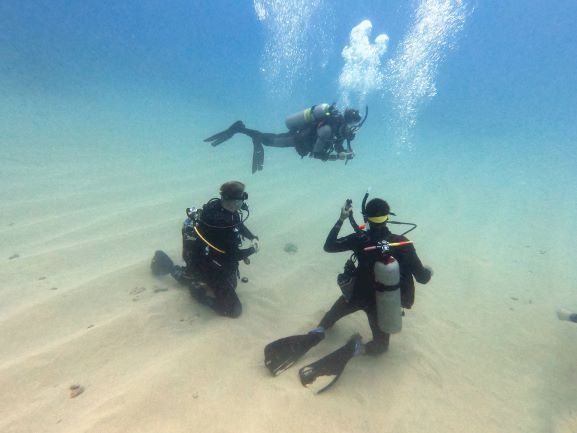
Prerequisites:
- Must be certified open water divers or higher.
- Must be at least 10 years old.
Materials Needed:
- Materials needed will be provided.
Cost:
$232
SEARCH & RECOVERY DIVER
From treasure hunting to public safety diving, to simply dropping something overboard or off the dock, divers with skills in search and recovery are highly sought after by divers and non-divers alike. Students will learn to execute detailed dive planning, multiple search patterns and techniques with and without compass navigation to find large and small objects.
Searching is only half the story. Once an object is found, how do you bring it safely to the surface? Students will learn about knots, lift bags, and various lifting techniques.
Course breakdown:
This course is conducted over two days and includes four dives.

Prerequisites:
- Must be certified as advanced open water divers or Open Water Diver and Underwater Navigation Diver
- Must be at least 12 years old.
- Dive 1 cannot exceed 100 feet.
Materials Needed:
- Materials needed (lines, reels, lift bags) for the course will be provided for use during the dives.
- Students should have a compass and underwater slate.
Cost:
$360
SELF RELIANT DIVER
Most diving is done with a buddy or a group. There are times when going solo may be appropriate if you have the training and equipment.
The self-reliant diver will learn about the skills, techniques and equipment necessary to make safe dives without a buddy, and become more independent and confident in their diving skills- also making them a better buddy. Solo diving is not for everyone and students will learn the additional risks associated with diving alone as well as the techniques to reduce those risks. Significant dive experience is required. The training is not easy. Students must learn to calculate their breathing rates at various depths, perform a no-mask swim, deploy surface marker buoys, learn to carry and use redundant air sources, and practice advanced navigation. It’s not for everyone, or every situation, but you will definitely become a better and more confident diver after this course.
Course breakdown:
This course is taught during three dives over two days.
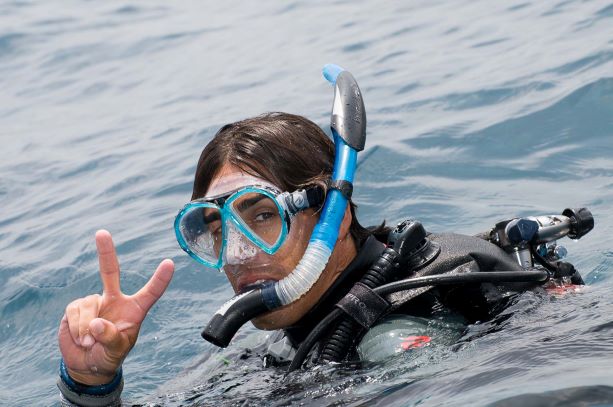
Prerequisites:
- Students must be certified as advanced open water divers or higher.
- Must be at least 18 years old.
- Must have at least 100 logged dives.
- You’ll also have to complete a full dive skills assessment (during a dive) with your instructor before being allowed to take the course.
Materials Needed:
- Surface marker buoy
- Redundant gas source (pony bottle, etc.)
- Redundant dive computer
- Underwater slate
- Redundant surface signaling device
- Students may be able to use gear provided on an as needed basis.
Cost:
$617
SHARK CONSERVATION DIVER
Sharks are an essential part of a healthy ocean. This course explores why they are vulnerable, the importance of a healthy shark population, managing threats and how to take action to protect them.
Love sharks? Scared of sharks? Or do you just want to know more about them? Enroll in an AWARE Shark Conservation Specialty course and discover the value of sharks to marine ecosystems and economies. You’ll learn more about the causes of declining shark populations and the actions you can take to become a knowledgeable and passionate shark defender. By being informed, you can dispel misconceptions and act to protect sharks. Sharks need you!
At the end of your classroom session and two open water dives, you will be able to explain:
- The conservation status of sharks, why they are unique and vulnerable, and the importance of healthy shark populations.
- How to manage threats to sharks, recognize the value of sharks and remove barriers to conservation.
- Actions you can take to protect sharks and how joining a global movement of divers can help to protect sharks.
Course breakdown:
- 1 classroom session
- 2 open water dives
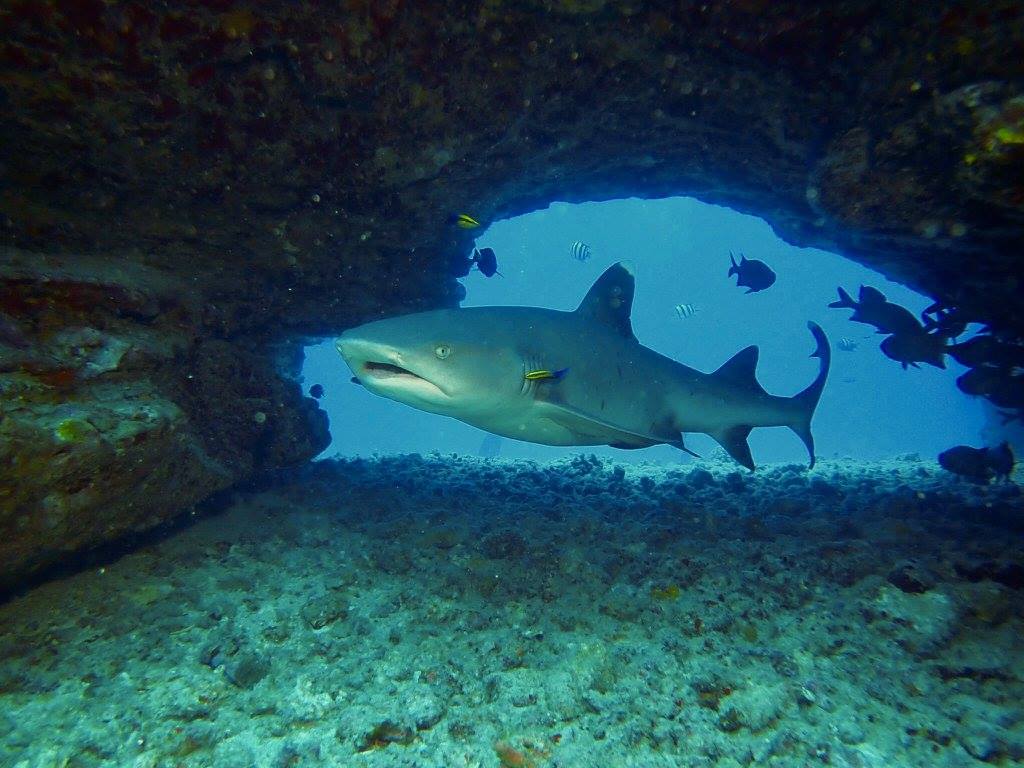
Prerequisites:
- Must be certified as a PADI (Junior) Open Water Diver or higher
- Must be at least 12 years old
Materials Needed:
- Materials needed will be provided.
Cost:
$154
UNDERWATER NATURALIST DIVER
A large number of divers learned to dive to explore the underwater environment. Knowing what you see will help you to understand that world and even be able to predict what you can expect to see in different oceans, habitats, and depths.
This course will teach you all about the natural world from the types of marine habitats to the creatures that live there.
Course breakdown:
- 2 open water dives.
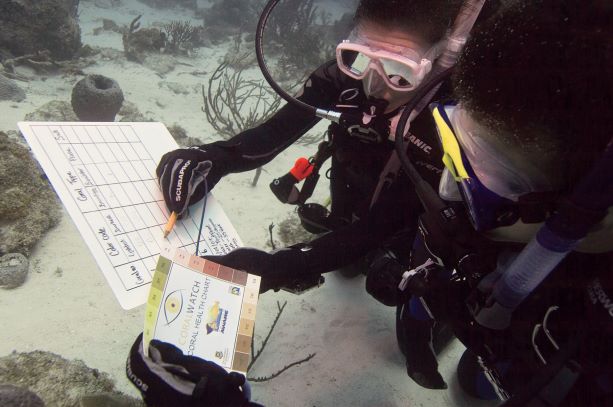
Prerequisites:
- Must be certified open water divers or higher.
- Must be at least 10 years old.
Materials Needed:
- The only additional equipment needed for this dive is an underwater slate.
Cost:
$232
UNDERWATER NAVIGATOR DIVER
There is no underwater GPS.
The ability to navigate underwater is an essential diving skill that many divers have yet to master. Whether you need to return to a shore entry point or to a moored vessel: swimming underwater is usually enjoyable than long surface swims.
This course will teach divers ways to navigate underwater using a compass, as well as natural navigation skills based on cues from the environment. Students will learn to mark and relocate positions, make underwater site maps, and methods to estimate distance.
Course breakdown:
This course is conducted during three open water dives.
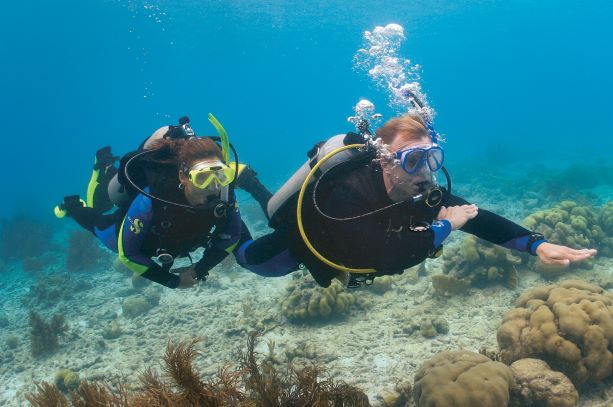
Prerequisites:
- Must be certified open water divers or higher.
- Must be at least 10 years old.
Materials Needed:
- Compass
- Underwater slate.
Cost:
$360
DIGITAL UNDERWATER PHOTOGRAPHER DIVER
Photography is the easiest way to share your dive experiences with other people. It also provides you a record of your sightings and a great way to look up that interesting fish or creature you encountered on your last dive.
Students will be instructed on topics ranging from white-balancing, composition, lens selection, and shutter speeds, to the challenges of increasing depth and the use of strobes (flashes).
Course breakdown:
This course takes 1-2 hours to complete in addition to 2 open water dives where you will practice your skills.
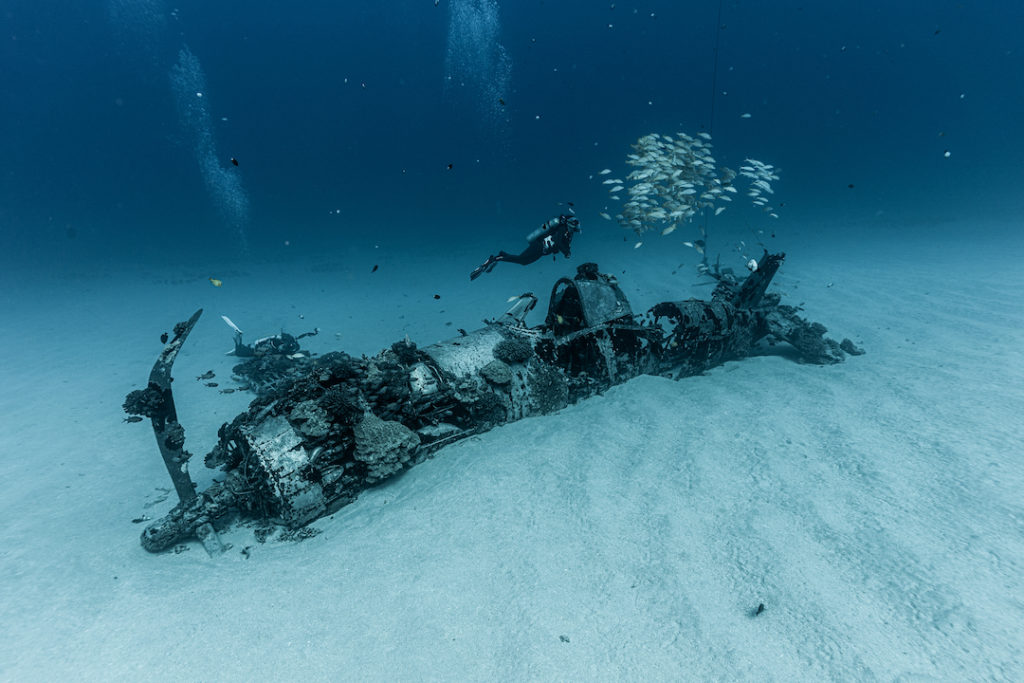
Prerequisites:
- Must be certified open water divers or higher.
- Must also already be familiar with changing settings on their camera.
Materials Needed:
- Students must have their own underwater camera or camera system (i.e. camera, underwater housing, strobes, etc.). A camera that can be manually white-balanced or has external strobes is recommended.
- Additionally, they must have the PADI Digital Underwater Photographer Manual, a white balance slate, and access to a computer to download images.
Cost:
$308
WRECK DIVER
Wreck sites are fascinating places to explore underwater. Some are purposely sunk as artificial reefs and others have gone down due to accidents, either way, these unique places offer habitat to marine creatures and they teem with life just a few years after coming to a rest on the bottom. Not all wrecks are ships, though many are, they can also be planes, cars, trains, and even the occasional school bus. Whether large or small, deep or shallow, wreck are exciting. Students in the PADI Wreck Diver course will learn to safely explore the interior of wrecks by practicing skills in dive planning, site survey and mapping, reel use, and alternate kicking techniques.
Course breakdown:
The PADI Wreck Diver course is conducted during four dives over at least two days.
Prerequisites:
- Students must be Adventure diver certified or higher.
- Must be at least 15 years old.
- Dive 1 not to exceed 100 feet (130 feet including horizontal and vertical distance from the surface).
Materials Needed:
- Students will need a dive light, slate, compass, and line reels. These may be provided for use during the course as needed.
Cost:
$514

